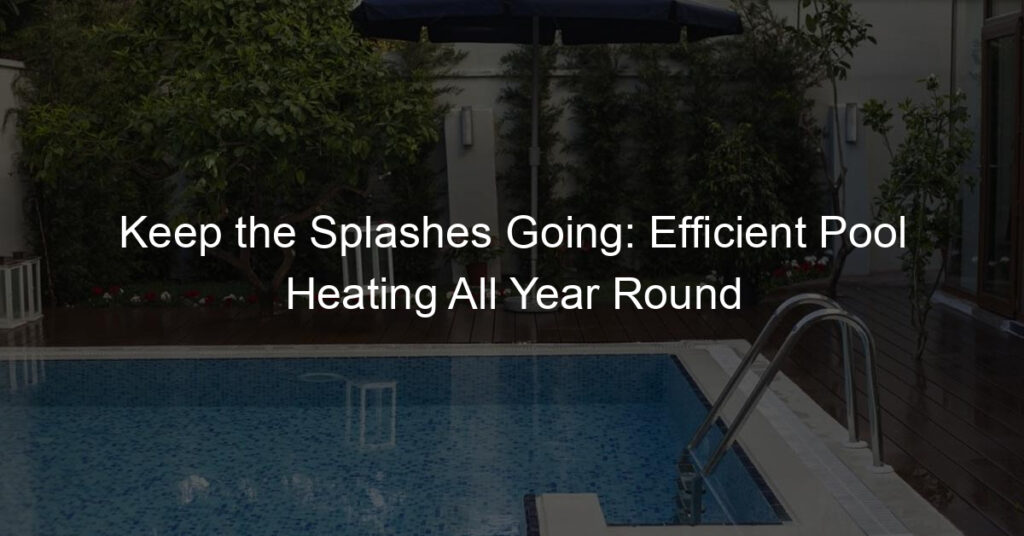Introduction to Pool Heating Systems
Swimming pools are a great addition to any home, providing a place for relaxation, exercise, and entertainment. However, the enjoyment of your pool shouldn’t be limited by the weather. This is where pool heating systems come into play. These systems allow you to maintain a comfortable water temperature, extending your swimming season and increasing the overall use of your pool.
Pool heating systems are essential for several reasons. Firstly, they provide comfort. Swimming in cold water can be unpleasant and may deter you from using your pool. A heating system ensures the water is always at a comfortable temperature, regardless of the weather.
Secondly, they extend your swimming season. Without a heating system, pool use is typically limited to the warmer months. With a heating system, you can enjoy your pool year-round. Lastly, they can increase the value of your home. A heated pool is a desirable feature for many homebuyers, potentially increasing the resale value of your property.
-
- Benefits of year-round pool use
Having the ability to use your pool throughout the year comes with numerous benefits. For one, it provides a convenient way to stay active and fit, regardless of the season. Swimming is a low-impact exercise that is suitable for people of all ages and fitness levels.
Year-round pool use also offers endless entertainment for your family and friends. Whether it’s a summer pool party or a winter swim, your pool can be the center of fun and enjoyment all year long. Additionally, it can serve as a personal oasis, providing a place for relaxation and stress relief.
In the following sections, we will delve into the different types of home pool heating solutions, helping you choose the best one for your needs.
Types of Home Pool Heating Solutions
Energy-Efficient Pool Heaters
- Overview of energy-efficient pool heaters
Energy-efficient pool heaters are designed to minimize energy consumption while providing optimal heating for your pool. They come in various types, including heat pumps and solar heaters. - Benefits and drawbacks
The main advantage of energy-efficient heaters is their low operating cost. However, they may have higher upfront costs and depend on external factors like weather for optimal performance. - How pool heat pumps work
Pool heat pumps work by extracting heat from the air, amplifying it, and transferring it to the pool water. They are highly efficient and cost-effective in warm climates. - Pros and cons of pool heat pumps
Heat pumps are efficient and have low operating costs. However, they are less effective in cold climates and have higher upfront costs compared to traditional heaters. - Understanding solar pool heaters
Solar pool heaters use solar panels to capture heat from the sun and transfer it to the pool. They are the most eco-friendly option for pool heating. - Advantages and disadvantages of solar pool heaters
Solar heaters have minimal operating costs and are environmentally friendly. However, they require a large area for solar panel installation and are dependent on sunny weather. - Importance of maintaining pool temperature
Maintaining a consistent pool temperature ensures comfort for swimmers and can extend your swimming season. It also helps to prevent algae growth and maintain water quality. - Effective strategies for temperature maintenance
Strategies include using a pool cover to reduce heat loss, running your heater during off-peak hours, and regularly checking and adjusting your pool heater settings. - How to save money on pool heating
To save money on pool heating, consider investing in an energy-efficient heater, using a pool cover, and maintaining your heater to ensure it operates efficiently. - Investing in cost-effective pool heating systems
Cost-effective pool heating systems include heat pumps and solar heaters. While they may have higher upfront costs, they can save you money in the long run due to their low operating costs. - Steps to winterize your pool
Winterizing your pool includes balancing your water chemistry, cleaning your pool, lowering the water level, draining your pool equipment, and covering your pool. - Importance of winter pool maintenance
Winter pool maintenance is essential to prevent damage to your pool and equipment during the cold months. It also makes opening your pool in the spring easier. - Benefits of winter pool use
Using your pool in the winter can provide a unique and enjoyable experience. It also allows you to get more use out of your pool investment. - How to heat your pool efficiently in winter
To heat your pool efficiently in winter, consider using a high-efficiency gas heater or a heat pump, and always use a pool cover when the pool is not in use.
Final thoughts
With the right pool heating solution, you can enjoy your pool year-round. Consider your climate, budget, and pool usage when choosing a pool heating system. To heat your pool efficiently, invest in an energy-efficient heater, use a pool cover, maintain your heater, and run your heater during off-peak hours.














